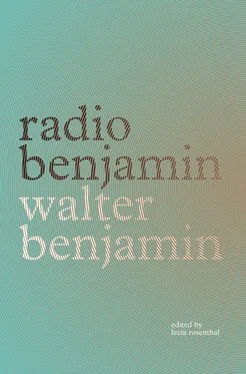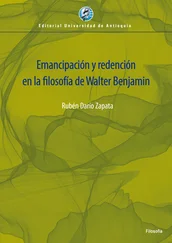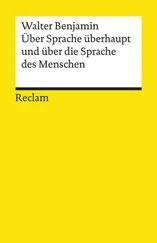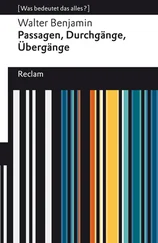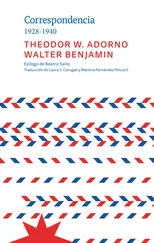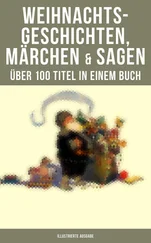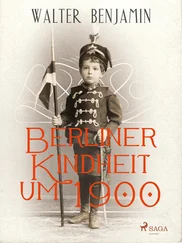The Cologne broadcast on September 9, 1932, from 4:20–5:00 pm, was scheduled as part of the station’s youth radio programming and was directed by Carl Heil.
Much Ado About Kasper is the only broadcast of Benjamin’s for which an audio-recording exists, albeit a partial one. Benjamin’s voice cannot be heard. The audio fragment is most likely from the production in Cologne.
In a letter to Scholem dated February 28, 1933, Benjamin gave Much Ado About Kasper an affirmative spin rare for his comments about his radio works. Speaking of his “works for radio” generally, he notes that even he hasn’t “been successful in collecting them all. I am speaking of the radio plays, not the series of countless talks, which [will] now come to an end, unfortunately, and are of no interest except in economic terms, but that is now a thing of the past. Moreover, most of these radio plays were written together with others. Notable from a technical point of view perhaps is a piece for children, which was broadcast last year in Frankfurt and Cologne; I may be able to secure you a copy at some point. It’s called ‘Radau um Kasperl.’” 4
1The name Maulschmidt, when broken down into its components in German, can be understood literally as Maul, “snout,” “mug,” or “muzzle,” and Schmidt, or the common “smith.” Together they create a satirical proper name that is not common in German. An English equivalent might be something like: mouth-smith, mug-maker, or snout-forger.
2The German for radio and broadcasting, Rundfunk, is made up of the words rund, which means round, and Funke., spark. The English “radio” carries a similar connotation of dissemination outward, as in radiality. Kasper’s humor depends on the embedded German connotation of radiating fire or disseminating sparks, which cannot be conveyed in the English.
3In addition to the typescript of the play, the Benjamin archive includes a text entitled “Kasper and the Radio: A Story with Noise” [ Kasper ] und der Rundfunk: Eine Geschichte mit Lärm ], which the GS editors tentatively conclude was related to the Frankfurt broadcast and the above request for the children to guess what the sounds were. The text of “Kasper and the Radio” (reproduced in GS, 7.2, 832–6), is something like an outline or summary version of Much Ado About Kasper. It describes the scenes of the play and the interrupting noises, and is divided into divided into six “hubbubs” [ Radau ]. The text begins with an introduction: “The following draft outlines a storyline containing a series of episodes in a fixed framework. The basis of these episodes is a variety of characteristic types of sounds punctuated here and there with hints and words. In a short introduction the speaker indicates the gist of the following radio play to his listeners, placing before them the task of envisioning the episodes, which are not fully fleshed out. The listeners are then asked to assess the respective sounds according to their imagination and wishes, and to send their solutions to the radio station for a potential prize” (GS, 7.2, 832–3). This short summary version, in other words, emphasizes the acoustic elements and sound-play of the play.
4Benjamin, The Correspondence of Walter Benjamin, 403–4.
CHAPTER 31. The Cold Heart
A Radio Play Adapted from Wilhelm Hauff’s Fairy Tale 1
By Walter Benjamin and Ernst Schoen 2
Dramatis personae
RADIO ANNOUNCER
COAL PETER
LITTLE GLASS MAN
DUTCH MICHAEL
EZEKIEL
SCHLURKER
DANCE HALL KING
LISBETH
BEGGAR
MILLER
MILLER’S WIFE
MILLER’S SON
A VOICE
POSTILION
Prologue
RADIO ANNOUNCER: Dear Radio Listeners, welcome once again to the Youth Hour. Today I think I will read you another fairy tale. But which one shall I read? Let’s have a look in our big dictionary, filled with the names of all of the writers of fairy tales, kind of like a telephone book. I should be able to pick one out from there. So, A as in abracadabra? That’s not for us. Let’s leaf through the book a little further. B as in Bechstein … that would be good, but we just had him recently.
A knock at the door.
C as in Celsius, as opposed to Réaumur. D, E, F, G.
Louder knocking at the door.
H as in Hauff, Wilhelm Hauff, yes, that’s the one for us.
Even louder pounding at the door.
What is this devilish noise here at the radio station? Good heavens! How are we to get on with our Youth Hour! Very well, come on in! ( Whispering. ) They are ruining the whole Youth Hour — Well, what is it then? How strange you are! What do you want?
COAL PETER: We are the characters from “The Cold Heart,” the fairy tale by Wilhelm Hauff.
ANNOUNCER: From “The Cold Heart” by Wilhelm Hauff? Well, you have come right on cue! But how did you get here? Don’t you know this is a radio station? You can’t just come barging in!
COAL PETER: Are you the Announcer?
ANNOUNCER: Indeed, I am.
COAL PETER: Well, then we are in the right place. Everybody, come on in and close the door. And perhaps now we should introduce ourselves.
ANNOUNCER: Yes, but—
The introduction of each character from the fairy tale is accompanied by a little melody played on a music box. 3
COAL PETER: I am Peter Munk, born in the Black Forest. They call me Coal Peter, because along with my father’s guild jacket with the silver buttons, and the red stockings for special occasions, I also inherited the trade of charcoal-burner.
LITTLE GLASS MAN: I am the Little Glass Man. I am only three and a half feet tall, but I have great power over the fates of human beings. If you were born lucky, Mr. Announcer, and some day you’re taking a walk through the Black Forest, and you see a little man in front of you in a peaked hat with a broad brim, a doublet, pantaloons, and short red stockings, then make your wish quick, for then you have caught sight of me.
DUTCH MICHAEL: And I am Dutch Michael. My jacket is of dark linen, I wear my trousers of black leather with broad, green suspenders. And in my pocket I carry a ruler made of brass, and along with that I wear the boots of a raftsman, but all of it is so grossly oversized that for the boots alone a dozen calves were needed.
EZEKIEL: I am fat Ezekiel, so named because my girth is so colossal. And I can afford it. I am considered the richest man in the area, and rightly so. Twice a year I travel to Amsterdam to deliver lumber, and while all the others must return on foot, I can ride in a coach.
SCHLURKER: I am tall Schlurker, the tallest and thinnest man in the whole of the Black Forest. I am also the boldest; in an overcrowded pub, I always take up more room than four fat men together.
DANCE HALL KING ( coyly ): Allow me to introduce myself, Mr. Announcer. I am the Dance Hall King.
DUTCH MICHAEL ( interrupting him ): That’ll do, Dance Hall King, no need to put on airs here. I know where your money comes from, and that you were once a lowly woodcutter.
LISBETH: I am Miss Lisbeth, the daughter of a poor lumberjack. I am, however, the most beautiful and virtuous woman in all the Black Forest and I am engaged to be married to Peter Munk.
BEGGAR: And I am the very last, for I am nothing but a poor beggar. Yet, I will have an important, if small, role to play.
ANNOUNCER: Well, I’ve heard so much about you, my head is spinning. But what brings you here to the radio station? Why are you disturbing me in my work?
COAL PETER: To tell you the truth, Mr. Announcer, we really wanted to visit Voice Land just once.
Читать дальше
